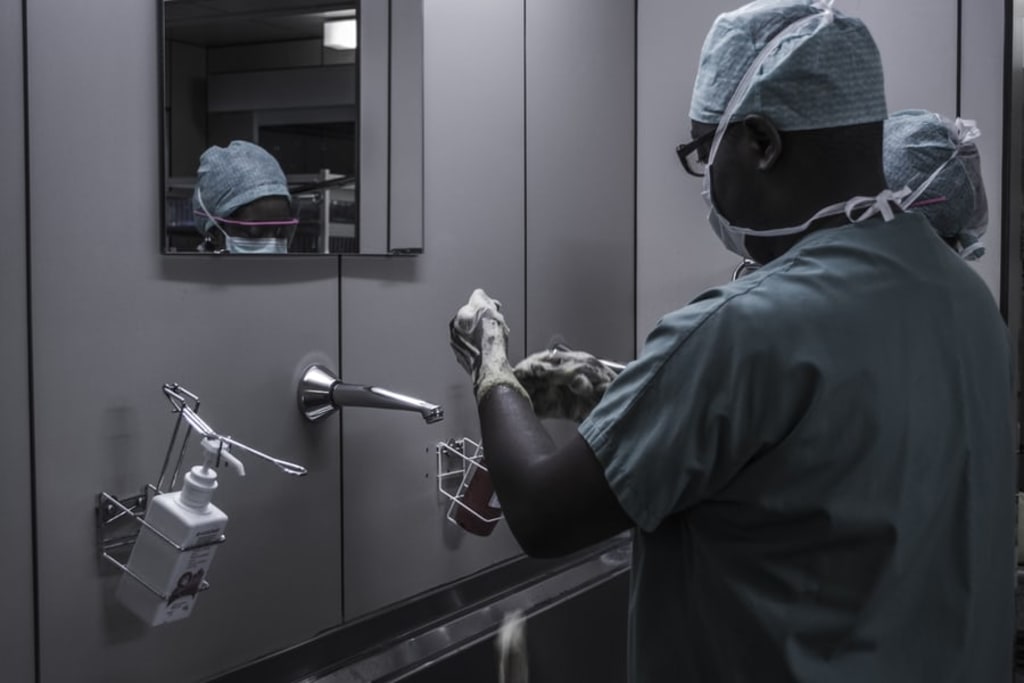What Does Critical Thinking Have to Do With Handwashing? Everything
Physician and surgical oncologist Dr. James Goydos recalls the hand washing tradition that found surgeons dipping their hands in bacteria went unquestioned for decades.

This article was previously published on Dr. James Goydos' Medium January 2021.
I was recently posed the following question: If you were placed in a role as an "educator" for a week, what would you teach and why?
I found this question interesting because for 25 years I was an educator. I started out in 1995 as an Assistant Professor in the Department of Surgery at what is now Rutgers Robert Wood Johnson Medical School. By 2018, I was a tenured Surgical Professor and an Adjunct Professor of Tumor Biology in the Department of Pharmacology at Rutgers. Over that quarter century, I gave lectures to undergraduates, took medical students and surgical residents on teaching rounds in the hospital, conducted melanoma research, supervised and instructed residents and junior faculty in the operating room, and gave lectures at National and International meetings to physicians and PhD researchers.
During my time as an educator, I discovered two universal truths:
First, it is fairly easy to teach people factual data, especially when you can demonstrate, in a logical fashion, how these facts were derived.
Second:
It is extremely hard to teach people how to think critically." - Dr. James Goydos
To explain what I mean, I offer the following example: In 1991, I was a surgical resident doing a 4-month rotation at the Shriner's Burn Institute of the Massachusetts General Hospital in Boston. Mass General is one of the oldest and most prestigious hospitals in the world and the faculty are considered outstanding in all fields.
As you might imagine, an institution with this type of history and reputation has many traditions that have been handed down for generations. One such tradition was for surgeons, once they had scrubbed their hands at the scrub sink, to dip their arms up to the elbows in red-tinted isopropyl alcohol, letting them dry before proceeding to the operating room.
No one else in the country does this, and it attracted the attention of a young infectious disease doctor from Johns Hopkins. This young doctor tested the red alcohol and found a dozen heretofore unknown types of bacterial that had developed the ability to live in isopropyl alcohol. Confronted with this information, the surgical faculty and leadership shrugged.
They told the young doctor they had been scrubbing before operations the same way for 200 years, and they weren't going to change now. No matter what was in the alcohol.
It took the Massachusetts Health Department to shut this practice down, with the surgeons fighting it to the bitter end.
I use this example because these were some of the most experienced surgeons in the world, at one of the most prestigious hospitals, who never bothered to examine practices that began 200 years ago. The surgeons that taught them said, "this is the way you should scrub before an operation", just as every generation of surgeons had been taught for two centuries. However, the young doctor from Johns Hopkins was outside this closed system and therefore could apply critical thinking to the problem.
Critical thinking is the art of examining what you are being taught or what you are experiencing, and being able to look past the surface to examine all aspects of the situation. Thinking critically is coming to a conclusion based on facts, not simply what you were told. The ability to think critically is an asset which will pay dividends long after the initial investment of time taken to learn. It is one of the several skills which will be further refined over a lifetime.
As an educator, I would offer a class on how to think critically. How to question orthodoxy, and how to examine something from all angles in the pursuit of truth. This is a trait that is sorely lacking in the world today.
About Dr. James Goydos
Dr. James Goydos is an expert in melanoma research and specialist in surgical oncology with an M.D. from Rutgers University. With over 20 years of experience as a Professor, Surgeon, and Clinical Trial Lead, he is a leading expert in his field.
Subscribe to James Goydos’ newsletter. Follow me on Good Men Project, Newsbreak, Hubpages, Loop, Medium, Instagram, Facebook,YouTube, Medika Life, Doximity, Github, Kaggle, Vocal, LinkedIn,Pinterest, Wordpress, Carrd, YouStack, and Twitter!
About the Creator
James Goydos, MD
James Goydos MD - Doctor, surgeon & expert on skin cancer. M.D. from Rutgers. Experience as a Professor of Surgery, Surgical Oncologist, & clinical trial leader. Writing on cancer, detction with camera / computer vision and healthcare.






Comments
There are no comments for this story
Be the first to respond and start the conversation.